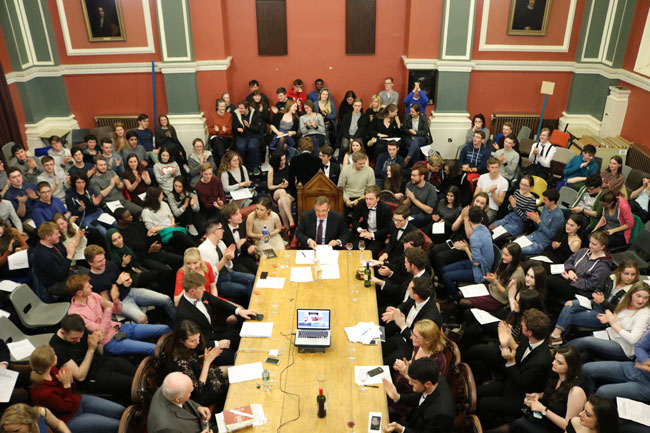
The University Philosophical Society (the Phil) in association with Trinity Politics Society, held a US election debate yesterday evening. Chaired by RTÉ’s Bryan Dobson, the motion stood as “This House Would Not Vote”.
Second-year theoretical physics student Arran Bolger opened the debate by emphasising that an individual vote does not impact the system in any substantial way. He claimed that democracy is often undermined by an apathetic electorate who vote out of a misguided sense of civic duty, thus drowning out the voices of those who are genuinely affected by a certain issue.
First-year politics, philosophy and English student, Sarah Griffin, argued that the flaws in the current system are partly a result of low voter turnout. She pointed out that a high turnout is necessary to counter more ideologically extreme voters.
For second-year science-student Andrew Connolly, however, voting is just a part of the machine which killed America. As he put it succinctly, “you can’t fix the system from within the system especially when the system itself is fixed”. Connolly did not, however, offer any suggestions on how we should try go about fixing this system.
The next speaker, Vincent Lavery, did offer a solution. “It’s either the ballot or the bullet”, the Ex-Overseas Chair for Bernie Sanders claimed. “And the country has had enough of the latter”. Lavery was highly critical of the mass media in his speech, suggesting that they created the Trump-monster by rewarding his scandalous actions with constant coverage.
First-year PPES student Katie Kleine disagreed with the notion that the President could do untold damage to the country. She emphasised that this role is constrained by a checks and balances system and that it is Congress who holds the real power. She also drew attention to the flaws with the electoral college system, which means that if she doesn’t vote with the majority leader in her state, her vote will be ignored completely. Furthermore, she disputed the “lesser of two evils” argument, suggesting that siding with either is to be “glaringly and openly complicit with whatever politics they institute while they’re in office”.
First-year European studies student Hannah-Sophia Cogan took a different view. She argued that voters don’t abandon their moral code by voting for candidate they may disagree with on certain issues. “They’re simply choosing the candidate who cause the least damage”, she claimed, going on to say that voting legitimises any complaints they raise against the President once in office. She also complicated Kleine’s checks and balances argument by pointing out that President does not need Congressional approval when taking military action. Voting thus becomes a moral duty to ensure this power ends up in the right hands.
Second-year English and drama student Ferdy Emmett disagreed. In his speech, which had a Doctor Who theme running throughout, Emmett claimed that a vote can actually do more harm than good. An uneducated vote, he said, is far worse than no vote at all. This point was later challenged by Dobson, who questioned who gets to decide these standards.
The debate was concluded by what Dobson aptly termed an “impassioned” speech from second-year history student, Louis Hoffman. Hoffman saw abstaining from voting as a danger to the very concept of democracy itself. Similarly to Cogan, he questioned voters’ right to complain about a broken system if they won’t do anything to fix it. Hoffman concluded his speech by urging voters to take personal responsibility and make a choice.
Dobson praised the “excellent” speeches in his closing remarks. He also spoke of his own memories as a journalist working in South Africa in 1994 when all citizens were given the right to vote for the first time. He described witnessing people sometimes queuing for days to cast their vote as an “amazing, humbling and life-changing experience” and remarked that he never again took his right to vote for granted.
The motion was put to the floor and was rejected.






